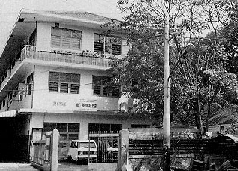 JAKARTA, Friday, Sept. 22 — The European Union tried to get Indonesia to declare a moratorium on the death penalty, European diplomats and Indonesian officials said, as firing-squad executions loomed for three Christians convicted in connection with anti-Muslim communal violence in 2000 and for three Muslims convicted for their roles in the 2002 Bali bombings.
JAKARTA, Friday, Sept. 22 — The European Union tried to get Indonesia to declare a moratorium on the death penalty, European diplomats and Indonesian officials said, as firing-squad executions loomed for three Christians convicted in connection with anti-Muslim communal violence in 2000 and for three Muslims convicted for their roles in the 2002 Bali bombings.But the government went ahead on schedule, putting the three Christians to death in Palu, on the island of Sulawesi, shortly after midnight on Friday, the lawyer for the three men told Agence France-Presse. Other news agencies also reported the executions, citing government officials they did not name.
“The European Union, along with many other like-minded countries, opposes the use of the death penalty in all circumstances,” the Finnish Ambassador, Markko Niinioga, wrote in a letter that was delivered Wednesday to Indonesian president, Susilo Bambang Yudhoyono. “The E.U. finds this punishment cruel and inhuman,” he wrote.
Ambassador Niinioka was writing on behalf of the European Union because Finland now holds the union’s rotating presidency. His letter was read to The New York Times on Thursday by a European diplomat, who did so on the condition of anonymity because the letter had not been released publicly. An aide to President Yudhoyono confirmed that it had been received.
Mr. Yudhoyono is considered a leading contender for the Nobel Peace Prize, because of his work in bringing about an end to the separatist war in Aceh, the country’s westernmost province. European diplomats said on Thursday that the executions could hurt his chances, given the strong anti-death-penalty sentiments among European governments.
A senior Indonesian government official, who was granted anonymity in order to learn the government’s response, said on Thursday that despite the letter, there was almost no chance of stopping the execution of the Christians. “We’re going to execute the Bali bombers soon after,” he added, by way of explanation.
In this overwhelmingly Muslim country, the government considers that the risk of political protests would be too great if it executed the Bali bombers and not the Christians.
The trial and conviction of the three Christians — two mechanics and a farmer —was in some manner a culmination of the Muslim-Christian violence that consumed Poso, a town in the province of Central Sulawesi, for eight years.
The condemned men were Fabianus Tibo, 60, Marinus Riwu, 48, and Dominggus da Silva, 42. When they were tried in 2001, no witnesses testified about seeing any of the men actually kill anyone, according to Dave McRae, a specialist in the Poso conflict at the Australian National University who wrote about the case in The Jakarta Post on Wednesday.
Mr. McRae, who attended the trial, wrote that the evidence against Mr. Riwu “was very weak,” with the only testimony against him saying that he had instructed other Christians in the use of arrows.
Even so, the three-judge court found that Mr. Tibo was the leader of a Christian militia called the “Red Group,” and that Mr. da Silva was one of his lieutenants.
More than 150 men have been tried in connection with the Poso violence, but only a handful of them were Muslims, the Associated Press reported. None of the other defendants received a sentence more severe than 15 years in prison, according to Mr. McRae.
The executions of the three men were originally scheduled for early August, but they were postponed at the last minute following an appeal by Pope Benedict XVI. After that, the scheduled executions of the Bali bombers was also postponed; with the Muslim holy month of Ramadan beginning on Sunday, it will probably be late October before a new date is set for them.


No comments:
Post a Comment